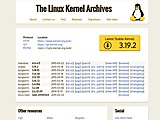 Linux is a mostly POSIX-compliant Unix-inspired operating system kernel, originally implemented by Linus Torvalds and now maintained as an international project. It's the base and common namegiver to a wide array of Linux distributions. The kernel provides all modern Unix-y features, like true process multitasking, virtual memory, virtual and clustered filesystem support, complex networking and extensive support for various hardware and machine platforms.
Linux is a mostly POSIX-compliant Unix-inspired operating system kernel, originally implemented by Linus Torvalds and now maintained as an international project. It's the base and common namegiver to a wide array of Linux distributions. The kernel provides all modern Unix-y features, like true process multitasking, virtual memory, virtual and clustered filesystem support, complex networking and extensive support for various hardware and machine platforms.
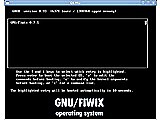 Fiwix is an operating system kernel written from scratch, based on the UNIX architecture and fully focused on being POSIX compatible. It is designed and developed mainly as a hobby OS and, since it serves also for educational purposes, the kernel code is kept as simple as possible for the benefit of readers or students. It runs on the i386 hardware platform and is compatible with a good base of existing GNU applications.
Fiwix is an operating system kernel written from scratch, based on the UNIX architecture and fully focused on being POSIX compatible. It is designed and developed mainly as a hobby OS and, since it serves also for educational purposes, the kernel code is kept as simple as possible for the benefit of readers or students. It runs on the i386 hardware platform and is compatible with a good base of existing GNU applications.
 Zswap-cli is a command-line tool to control zswap Linux kernel module options. Zswap is a compressed cache for swap pages. It takes pages that are in the process of being swapped out to disk and tries to compress them into a RAM-based memory pool with dynamic allocation. It trades CPU cycles for a significant performance boost since reading from a compressed cache is much faster than reading from a swap device. Features Currently supported features: CLI, environment variables and configu
Zswap-cli is a command-line tool to control zswap Linux kernel module options. Zswap is a compressed cache for swap pages. It takes pages that are in the process of being swapped out to disk and tries to compress them into a RAM-based memory pool with dynamic allocation. It trades CPU cycles for a significant performance boost since reading from a compressed cache is much faster than reading from a swap device. Features Currently supported features: CLI, environment variables and configu
 The OpenBSD project produces a free, multi-platform 4.4BSD-derived UNIX-like operating system. Emphasizing portability, standardization, coherency, correctness, proactive security and integrated cryptography. It comes with almost 9000 software package in its ports, including a custom X11 environment (Xenocara), desktop environments, web and multimedia applications, compilers and programming languages. It also harbours the OpenBSD-maintained software projects OpenSSH, LibreSSL, OpenIKED, OpenBGPD
The OpenBSD project produces a free, multi-platform 4.4BSD-derived UNIX-like operating system. Emphasizing portability, standardization, coherency, correctness, proactive security and integrated cryptography. It comes with almost 9000 software package in its ports, including a custom X11 environment (Xenocara), desktop environments, web and multimedia applications, compilers and programming languages. It also harbours the OpenBSD-maintained software projects OpenSSH, LibreSSL, OpenIKED, OpenBGPD
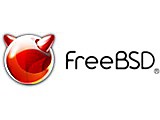 FreeBSD is an operating system and a major BSD distribution, which focuses on stability, performance, cutting-edge features and security. It's both UNIX® and Linux-compatible, ports a wide range of applications (24000), is suitable for server, embedded and desktop use. Has robust networking capabilities, cross-platform support, hardware and KMS/drm2 video drivers, hardware and network virtualization support, jails, dtrace, capsicum, understands ZFS and other filesystems, and simple installation
FreeBSD is an operating system and a major BSD distribution, which focuses on stability, performance, cutting-edge features and security. It's both UNIX® and Linux-compatible, ports a wide range of applications (24000), is suitable for server, embedded and desktop use. Has robust networking capabilities, cross-platform support, hardware and KMS/drm2 video drivers, hardware and network virtualization support, jails, dtrace, capsicum, understands ZFS and other filesystems, and simple installation
 ReactOS is a free and open source operating system written from scratch. It's design is based on Windows in the same way Linux is based on Unix, however ReactOS is not Linux. ReactOS looks and feels like Windows, is able to your run Windows software and your Windows drivers, and is familiar for Windows users.
ReactOS is a free and open source operating system written from scratch. It's design is based on Windows in the same way Linux is based on Unix, however ReactOS is not Linux. ReactOS looks and feels like Windows, is able to your run Windows software and your Windows drivers, and is familiar for Windows users.
 ErmineSI is a platform that allows custom syscall handling. No need to kernel module, everything done in user space.
ErmineSI is a platform that allows custom syscall handling. No need to kernel module, everything done in user space.
 FreeDOS is a complete, free, DOS-compatible operating system that you can use to play classic DOS games, run legacy business software, or develop embedded systems. Any program that works on MS-DOS should also run on FreeDOS. It doesn’t cost anything to download and use FreeDOS. You can also share FreeDOS for others to enjoy! And you can view and edit our source code, because all FreeDOS programs are distributed under the GNU General Public License or a similar open source software license.
FreeDOS is a complete, free, DOS-compatible operating system that you can use to play classic DOS games, run legacy business software, or develop embedded systems. Any program that works on MS-DOS should also run on FreeDOS. It doesn’t cost anything to download and use FreeDOS. You can also share FreeDOS for others to enjoy! And you can view and edit our source code, because all FreeDOS programs are distributed under the GNU General Public License or a similar open source software license.
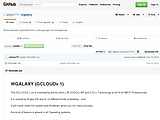 GCLOUD v.1 (WGALAXY) is an operating system based on the unix architecture and implemented in CHDollar Technology and C/C++. It is invented by wilmix jemin j IN CHDOLLAR and C/C++ Technology at 2016 for WSIT Professionals , clinet companies, etc It is ranked as A type OS due to 12 different kinds of Advanced desktop with cloud computing. We also use JAVA Technology to construct utilities . It is designed and developed mainly for companies, Industries,clients,Professionals, and WSIT/JAVA /
GCLOUD v.1 (WGALAXY) is an operating system based on the unix architecture and implemented in CHDollar Technology and C/C++. It is invented by wilmix jemin j IN CHDOLLAR and C/C++ Technology at 2016 for WSIT Professionals , clinet companies, etc It is ranked as A type OS due to 12 different kinds of Advanced desktop with cloud computing. We also use JAVA Technology to construct utilities . It is designed and developed mainly for companies, Industries,clients,Professionals, and WSIT/JAVA /
 NuttX is a real-time operating system. It strives to be lean, POSIX-compliant and portable. It runs on ARM, Atmel AVR, x86, MIPS, Hitachi and Zilog CPUs. It's modular, very configurable, scalable, is pre-emptive, provides core task management, FIFO and round-robin scheduling, realtime support, priority inheritance, tickless operation, POSIX/ANSI and VxWorks task controls, has message queues, semaphores, timers, signals, pthreads, environment variables, virtual filesystem support, BSD sockets, MM
NuttX is a real-time operating system. It strives to be lean, POSIX-compliant and portable. It runs on ARM, Atmel AVR, x86, MIPS, Hitachi and Zilog CPUs. It's modular, very configurable, scalable, is pre-emptive, provides core task management, FIFO and round-robin scheduling, realtime support, priority inheritance, tickless operation, POSIX/ANSI and VxWorks task controls, has message queues, semaphores, timers, signals, pthreads, environment variables, virtual filesystem support, BSD sockets, MM
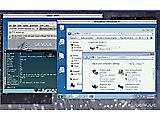 The Genode operating-system framework provides a unified application interface over different microkernel and hypervisor systems. It's a slim references implementations that runs atop Linux, L4ka::Pistachio, L4/Fiasco, OKL4, NOVA, Fiasco.OC, Codezero, and a custom kernel for ARM SoCs. Genode is designed for dynamic workload distribution while separating operation priviliges for rubustness.
The Genode operating-system framework provides a unified application interface over different microkernel and hypervisor systems. It's a slim references implementations that runs atop Linux, L4ka::Pistachio, L4/Fiasco, OKL4, NOVA, Fiasco.OC, Codezero, and a custom kernel for ARM SoCs. Genode is designed for dynamic workload distribution while separating operation priviliges for rubustness.
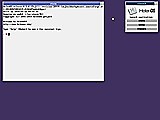 HelenOS is a microkernel-based operating system written completely from scratch. It is not UNIX-like and does not imitate any other OS. It runs on 7 different CPU architectures (IA-32, AMD-64, ARM, MIPS, PowerPC, SPARC, Itanium), supports SMP, networking, USB, sound and has its own original GUI.
HelenOS is a microkernel-based operating system written completely from scratch. It is not UNIX-like and does not imitate any other OS. It runs on 7 different CPU architectures (IA-32, AMD-64, ARM, MIPS, PowerPC, SPARC, Itanium), supports SMP, networking, USB, sound and has its own original GUI.
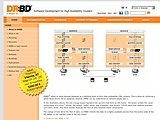 DRBD refers to block devices designed as a building block to form high availability (HA) clusters. This is done by mirroring a whole block device via an assigned network. DRBD can be understood as network based RAID 1.
DRBD refers to block devices designed as a building block to form high availability (HA) clusters. This is done by mirroring a whole block device via an assigned network. DRBD can be understood as network based RAID 1.
|